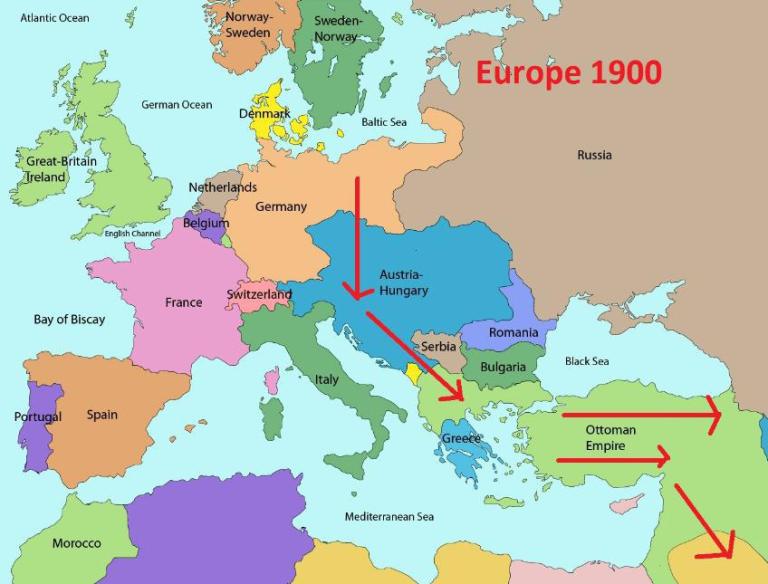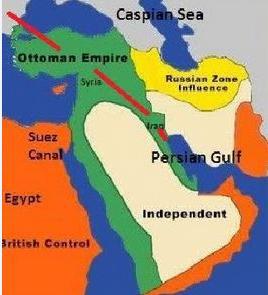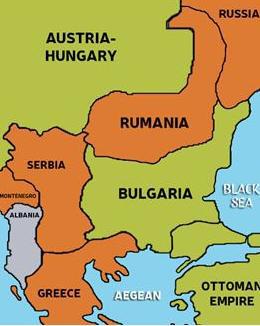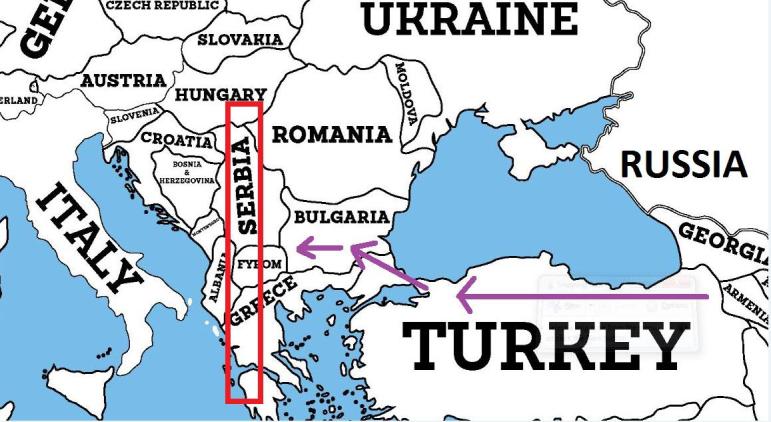Comparing 2015 with the First World War
In this chapter I would like to provide again a very brief summary of the First World War (1914-1918), in order to compare it with the current events. At the beginning of the 20th Century, the German Empire wished to connect itself to the Persian Gulf through the Baghdad Railway (German Empire-Austro-Hungarian Empire-Ottoman Empire). See the following two maps.
Picture 82

The Middle East in 1914, before WW1
Picture 83

With this railway network the Germans would import oil from the Persian Gulf and would export manufactured goods in Anatolia, the Persian Gulf and Asia. The German plans were a threat for the English, who wanted to control the oil of the Persian Gulf. The German presence in the Persian Gulf would also threaten the British presence in India, which at the time was Britain's most important colony.
The Germans were also a problem for the Russians, who wanted to control the Caspian Sea region and the oil of Baku. The Russians also eyed the Ottoman Straits that connected the Black Sea to the Aegean and the Mediterranean Sea, in order for the Russian Navy to have access to the Mediterranean Sea. France was almost constantly at war with Germany, since there were rich coal reserves between the two countries, for example in the regions of Alsace and Lorraine. Coal was the oil of the 19th Century, and to this very day many countries cover a very large part of their energy needs with coal.
With the Balkan Wars of 1912-1913, the English, the French and the Russians helped Greece, Serbia and Bulgaria to annex the European territories of the Ottoman Empire, in order to form a wall between the German Empire and the Ottoman Empire. Greece, Serbia and Romania formed a wall between Germany and Turkey, as you can see at the following map.
The Balkans after the Balkan Wars of 1912-1913
Picture 84

In 1914, the Austrian Duke Ferdinand was murdered in Sarajevo by the Serbs. Sarajevo is Bosnia's capital. At the time Bosnia belonged to the Austro-Hungarian Empire. Austro-Hungary declared war on Serbia, and the other powers rushed to support one of the two sides. That was the start of the First World War. It is claimed, correctly in my opinion, that the Second World War was a simple continuation of the First World War, since the geopolitical landscape was more or less the same with that of the First World War.
On the contrary, today's geopolitical framework is very different that the one of 1914. Today the Greek-Serbia axis that was created by the English, the French and the Russians with the Balkan Wars, it is a problem for the West, while it can still be very useful for Russia. NATO wants to connect the Caspian Sea reserves to Italy and Germany, because Putin gave the Germans and the Italians large stakes in the Russian natural gas industry. Italy got its stake through the South Stream and the Blue Stream Pipelines, while Germany got its stake through the North Stream Pipeline. NATO is to a large extent an energy alliance, and if Italy and Germany were to align themselves with Russia in energy issues, it would be the end of NATO, at least as we know it.
Bosnia-Herzegovina and the Former Yugoslav Republic of Macedonia (FYROM) are two countries which today are politically very unstable, and they have large Muslim and Slav elements in their populations. Turkey can influence the Muslim elements, and Russia can influence the Slavic ones. If Putin uses the corrupt political systems of Greece, FYROM, Serbia and Hungary in order to block the Southern Energy corridor, NATO will have no choice but to support Turkey and Albania. The two countries will use the Muslim elements of Greece and FYROM in order to annex some of the territories of these two countries, creating a corridor which will connect Turkey and Albania.
Picture 85

If on the other hand Greece allows the Southern Energy corridor to pass through its territory, Russia will have to use the Slavs in Bosnia and FYROM in order to cause a war. The war would destabilize the Balkans, blocking the Southern Energy Corridor, and preventing the natural gas of the Caspian Sea from reaching Italy and Germany. The only other scenario, the best one actually, is that the US, the EU and Russia will agree on a pipeline that will carry both Russian and Caspian natural gas.
However it is clear that contrary to the geopolitical framework of WW2, today's geopolitical framework is very different from the geopolitical framework of WW1. The only similarity is that everything seems set for a new Sarajevo. But let's hope that the great powers will work things out.







